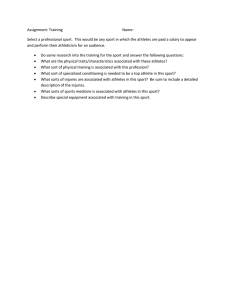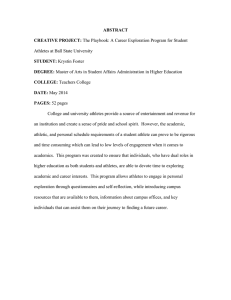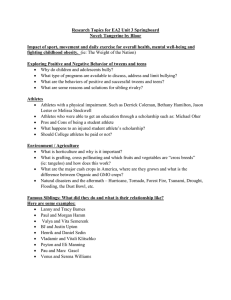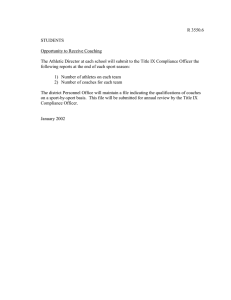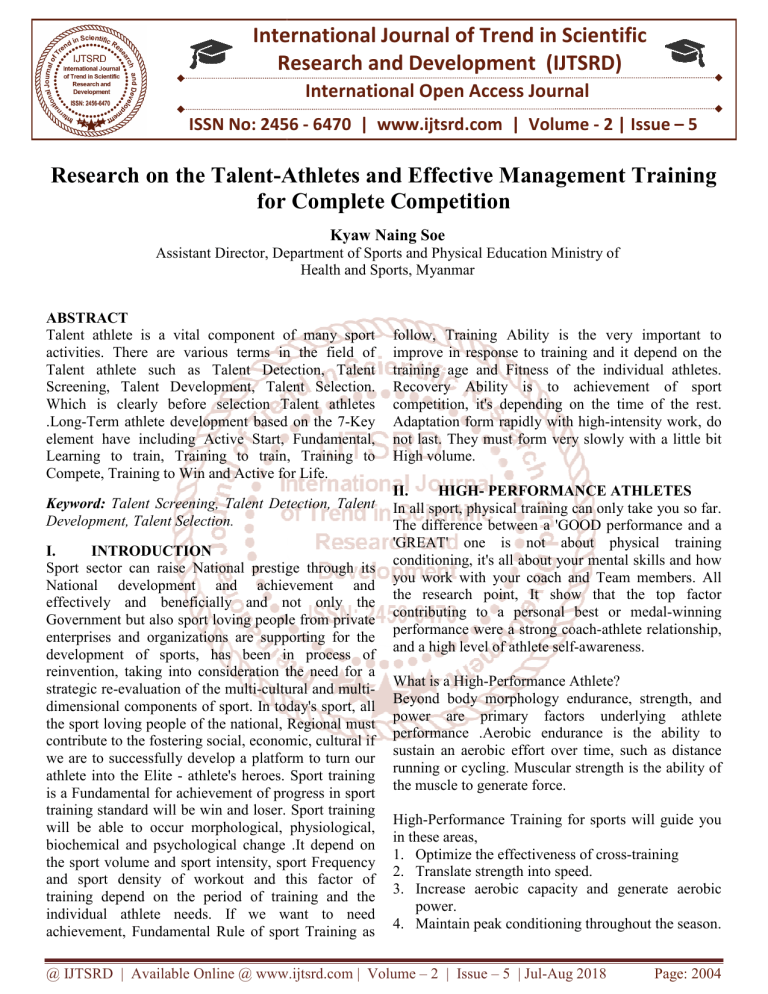
International Journal of Trend in Scientific
Research and Development (IJTSRD)
International Open Access Journal
ISSN No: 2456 - 6470 | www.ijtsrd.com | Volume - 2 | Issue – 5
Research on the Talent-Athletes
Athletes and Effective Management Training
for
or Complete Competition
Kyaw Naing Soe
Assistant Director, Department of Sports and Physical Education Ministry of
Health and Sports, Myanmar
ABSTRACT
Talent athlete is a vital component of many sport
activities. There are various terms in the field of
Talent athlete such as Talent Detection, Talent
Screening, Talent Development, Talent Selection.
Which is clearly before selection Talent athletes
.Long-Term
Term athlete development based on the 77-Key
element have including Active
ctive Start, Fundamental,
Learning to train, Training to train, Training to
Compete, Training to Win and Active for Life.
Keyword: Talent Screening, Talent Detection, Talent
Development, Talent Selection.
I.
INTRODUCTION
Sport sector can raise National prestige through its
National development and achievement and
effectively and beneficially and not only the
Government but also sport loving people from private
enterprises and organizations are supporting for the
developmentt of sports, has been in process of
reinvention, taking into consideration the need for a
strategic re-evaluation of the multi-cultural
cultural and multi
multidimensional components of sport. In today's sport, all
the sport loving people of the national, Regional must
contribute to the fostering social, economic, cultural if
we are to successfully develop a platform to turn our
athlete into the Elite - athlete's heroes. Sport training
is a Fundamental for achievement of progress in sport
training standard will be win andd loser. Sport training
will be able to occur morphological, physiological,
biochemical and psychological change .It depend on
the sport volume and sport intensity, sport Frequency
and sport density of workout and this factor of
training depend on the period
od of training and the
individual athlete needs. If we want to need
achievement, Fundamental Rule of sport Training as
follow, Training Ability is the very important to
improve in response to training and it depend on the
training age and Fitness of the individual athletes.
Recovery Ability is to achievement of sport
competition, it's depending on the time of the rest.
Adaptation form rapidly with high-intensity
high
work, do
not last. They must form very slowly with a little bit
High volume.
II.
HIGH- PERFORMANCE ATHLETES
In all sport, physical training can only take you so far.
The difference between a 'GOOD performance
perfo
and a
'GREAT' one is not about physical training
conditioning, it's all about your mental skills and how
you work with your coach
ch and Team members.
m
All
the research point, It show that the top factor
contributing to a personal best or medal-winning
medal
performance were a strong coach-athlete
coach
relationship,
and a high level
evel of athlete self-awareness.
self
What is a High-Performance
Performance Athlete?
Beyond body morphology endurance, strength, and
power are primary factors underlying athlete
performance .Aerobic endurance is the ability to
sustain an aerobic effort over time, such as distance
running or cycling. Muscular strength is the ability of
o
the muscle to generate force.
High-Performance
Performance Training for sports will guide you
in these areas,
1. Optimize the effectiveness of cross-training
cross
2. Translate strength into speed.
3. Increase aerobic capacity and generate aerobic
power.
4. Maintain peak conditioning throughout the season.
@ IJTSRD | Available Online @ www.ijtsrd.com | Volume – 2 | Issue – 5 | Jul-Aug
Aug 2018
Page: 2004
International Journal of Trend in Scientific Research and Development (IJTSRD) ISSN: 2456-6470
5. Minimize the interference effect.
6. Design energy-specific performance programs.
III.
HIGH-PERFORMANCE TRAINING FOR
ATHLETES
A high-performance training program is designed to
refine the skills and performance of individual
participating at a high level. The main aim is to
develop and enhance the physical capability of
athletes.
Why it's important for a athlete transiting into a
competition to know his or her body type.
Humans typically fall into one or three body type,
ectomorph, mesomorph and endomorph.
A. Ectomorph
Characteristics;
Small frame and bone structure
Thin
Long and stringy muscles
Flat chest
Thin shoulders with little width
Difficult to gain weight
Fast metabolism
B. Mesomorph
Characteristics;
Naturally muscular
Athletic
Strong
Well-defined muscles
Rectangular-shaped physique
Easy to gain muscle
Easier to gain body fat than ectomorphs
C. Endomorph
Characteristics;
Soft round body
Shorter "stocky" build
Round physique
Thick arms and legs
Difficult to lose body fat
Slow metabolism
IV.
PLANNING YOUR MEAL
Everything you eat causes metabolic and
physiological responses in your body. Each of the
three macronutrients-Protein, Carbohydrate, and Fat
plays in role in altering the shape and size of
physique. Meal frequency is an important part of
planning. How often you should eat a meal based on
your body type. Here's a general guideline for how
often you should eat a meal based on body type.
Ectomorph; every 2-3 hours
Mesomorph; every 2.5-3.5 hours
Endomorph; every 3.5-5 hours
The 4 main types of training are aerobic, anaerobic,
flexibility and strength training
Aerobic training include continuous activities,
such as running, swimming, circuit training and
long-interval training. Aerobic training involve
training the large muscle groups.(e.g. leg)to
efficiently combine with the cardio respiratory
system to supply a higher volume of oxygen to
working muscles and therefore improve
performance.
The (3) Rules of cardio equipment are as follow;
1. Warm up for (5) minutes beforehand.
2. Give every machine a 2-week test drive.
3. Switch machines every 3 to 4 weeks.
Anaerobic training involves high-intensity, short
duration exercise(such as interval training).This
method is characterized by repeated bursts over
short distances at high intensity and are design to
improve the two anaerobic energy pathways.
Flexibility training can be used to increase the
range of motion of the joint and reduced the an
injury and muscle soreness.
Strength training is used for many conditions.
Resistance training is to increase the amount of
force a muscle and increase the size of skeletal
muscle. The workout in this section have been
designed with four specific results in mind; losing
fat, building muscle, getting stronger, and
improving overall fitness. These are complete
programs that have been designed to get you
where you want to go in the quickest, most
efficient way possible.
For High-Performance athletes includes,
Dietary assessment
Nutrition Planning
Menu Planning
Supplement advice
Sports physician
Physiotherapists
Masseurs
Chiropractors
High quality training is imperative to ensure athletes
@ IJTSRD | Available Online @ www.ijtsrd.com | Volume – 2 | Issue – 5 | Jul-Aug 2018
Page: 2005
International Journal of Trend in Scientific Research and Development (IJTSRD) ISSN: 2456-6470
are prepared for high performance result.
3 Leading Factor for Top Performances are as
follows:
1. Strong Coach-Athlete Relationship.
2. Athlete Self-Awareness.
3. Optimal Training Environment.
Coaches and athletes must be at one with their
purpose goal in the high performance program and
follow through to achieve the athletes Goals.
Sport development is a process whereby effective
opportunities, processes, system and structures are set
up to enable and encourage people in all or particular
groups and areas to take part in sport for recreation or
to improve their performance to whatever level they
desire.(Collins 1995)
1. Participation Level
2. Performance Level
3. Excellence Level
I. Participation Level
Sport is now a habit, Embedded in lifestyle for
some time at least (ideal; lifelong), Social
dimension often important club.
II. Performance Level
Skilled play at a good club level, Competitive
III. Excellence Level
The peak of the pyramid, Elite sport at a high
level (Country, National and International
Competition)
There are mainly two factors contributing to lack of
confidence for athletes,
A. Subjective Uncertainly
B. Uncontrollability
To improve confidence, Athletes should be educated
to pay attention to those controllable factors such as
warming up and ignore those uncontrollable factors
such as referee.
The ultimate goal and intermediate goal of an athlete's
training is essential for planning the training. the main
source of relevant information about the goals of
training is competition. the demands of competition
together with an individual's predispositions(e.g.
health, level of abilities, talent) determine the methods
of training. the training plan must be effective, simple,
and controllable, in case of minor changes in its goal.
The quality of competition depends on the level of
skills and abilities of athletes and external conditions.
Knowing the importance of particular skills, physical
abilities, mental characteristics.
The style of sportsmen champion are physical and
mental
components
different
abilities
and
characteristics in different proportions. The style of
sportsmen in any sports includes the age when the
best results are most likely to be achieved. To make
plan for the goal training for effectiveness for the
main competition as follows,
A. Main tasks facing the athletes in the coming year.
The athletes' long –term development as well as
preparation for the year's main competition.
B. Schedule for the main competitions and for
competition athletes must quality for them.
C. The minimal skill level and abilities need in
competition.
D. Quantity, means, and methods of work that are
dedicated to develop each skill and ability.
E. Goal of training tasks to ensure the effectiveness
of preparation for the main competition.
F. To get the information , use for the training
process.(what, how, when to test)
G. The choice of criteria, tests, and methods of
control must relate to the goal and needs of
particular stages of the training process.
V.
METHOD
6-Key Element Selection Criteria, we should be
doing,
1. To select athletes with High standard Body
structure in order to get Highly Qualified Athletes.
2. To select Outstanding Athletes during two or three
years to get top performance As Aged- limited
sport discipline. (e.g. Football, Athletes………)
3. To choose outstanding and Brilliant Athletes As
Genetic.
4. To select Qualified Athletes and Train well As
Aged-Unlimited sport discipline.
5. To select Athletes Undaunted - Spirit and Zeal and
Perseverance.
6. To find out talented young and good mental new
generation Athletes.
3-Key Element, we should be doing, To improve
High-performance Athletes,
A. To choose effectively and systematically young
and new Generation Athletes.
B. To train young Generation with advanced
Technique with skilled coach and with intensive
training.
@ IJTSRD | Available Online @ www.ijtsrd.com | Volume – 2 | Issue – 5 | Jul-Aug 2018
Page: 2006
International Journal of Trend in Scientific Research and Development (IJTSRD) ISSN: 2456-6470
C. To Outstanding and Brilliant Athletes to ensure in
order to achievement sport activities.
To make plans for a year, the following factors
have to be considered,
Short- Term plan, we should be doing,
1. Local Competition to be competes.
2. Invitation Competition to be held.
3. Invitation Scientific Qualified Coach from aboard
to be train.
4. To get Latest Techniques and Tactic to be conduct
refresher Course for Coaches.
5. Joint-Training for Elite-Athlete and New young
Generation.
Long-Term plan, we should be doing,
A. International-Skill-Recognition Certificate Coach
to be appointed.
B. Conduction Local Training Courses with
Scientific qualified Coaches.
C. Sending sport related coaches, Referees and sports
official to aboard to attend international courses
and seminar and meetings.
D. Evaluation teaching methodology and training
methodology and sport selection criteria and
Administration and Teaching Aids in every years.
VI.
RESULTS
In this respect, it is advisable to suggest all of you that
one of the essential requirements for high
performance athletes is to benefit greatly with training
in autogenic breathing, visualization, and self-talk
monitoring. These simple tactics help athletes reduced
the stress response and allow them to perform at their
best. To make the right choices as contest day nears, it
will help to keep your goals and the methods you
choose to achieve them in perspective.
VII. CONCLUSIONS
The truth is, the science is saying exactly that Success
is probably due to hundreds of different factors, all the
interacting with one another. But the end result is that
if you take5oooM marathon athletes in Hot season
country, and 5000M marathon athletes in the Cold
season country,(e.g. Training at altitude) and expose
them to the same training, you will not see anything
like the same success rate. That is due to genetic
differences that are too complex to discover with the
approach that has been adopted now. That genetic is
vital, both in determining innate ability, and our
response to training, and even our motivation or
desire to exercise and train in the first place.
REFERENCES
1. Dan Lewindon, High Performance Training for
sports, www.humalkinetics.com
2. High
performance
sport-WIKIpedia,
htpp;//en.wikipedia.org'wiki>High---pe-3. High performance
syssm.com.au
training
for
athletes,
4. THE SCIENCE OF SPORT ,Talent training and
performance; The secrets of success//Genes vs
training
5. Dr. Leigh Robinson, Creating Excellent National
Sport Organizations, OCA Sport Congress, Book
of Research
6. Mohammad Ehsani, Ph.D. Tarbiat Modares
University, Tehran, Iran, mensaniteh@yahoo.com,
OCA Sport Congress, Book of Research
7. Seyed Reza Rahimi Moghaddam, Manager-Talent
Identification, Canadian Sport Centre Ontario,
Canada, smoghadda@cscontano.ca
8. Li-wei ZHANG, ph.D, Ed.D, Beijing Sport
University, liweizhang@hotmail.com(poster)
9. Science of Sports Training by Thomas Kurz
http;//www.stadion.com
@ IJTSRD | Available Online @ www.ijtsrd.com | Volume – 2 | Issue – 5 | Jul-Aug 2018
Page: 2007

